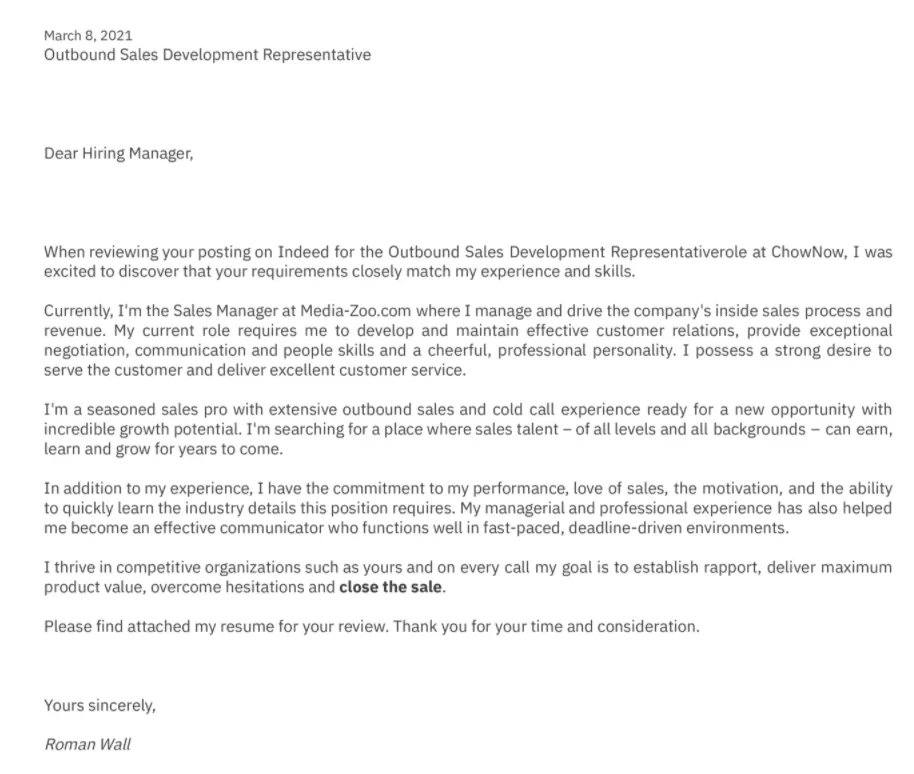Cover Letter Sales: The Power of a Great First Impression
In the competitive world of software sales, your cover letter is often the first impression you make on a potential employer. A well-crafted cover letter can be the key to unlocking your dream job, while a lackluster one can land your application in the digital trash. It’s more than just a formality; it’s your opportunity to showcase your unique skills, experience, and personality. A cover letter acts as your personal marketing document, and it needs to grab the reader’s attention immediately. Remember, the goal is to stand out from the crowd of applicants and convince the hiring manager that you’re worth an interview. Let’s dive into the top 7 tips to create a cover letter that wows!
Highlight Your Sales Skills
Your cover letter needs to immediately demonstrate your core sales competencies. Think about what makes you a successful salesperson. Do you have exceptional communication skills, the ability to build rapport quickly, or a proven track record of closing deals? Make sure to clearly state these skills. Provide specific examples of how you’ve used them in the past to achieve positive results. Showcase your ability to understand client needs, present solutions persuasively, and overcome objections. Mentioning these skills, supported by concrete examples, shows the hiring manager you are not just talking the talk, but walking the walk. Use keywords that align with the job description to help your application pass through Applicant Tracking Systems (ATS).
Quantify Your Achievements
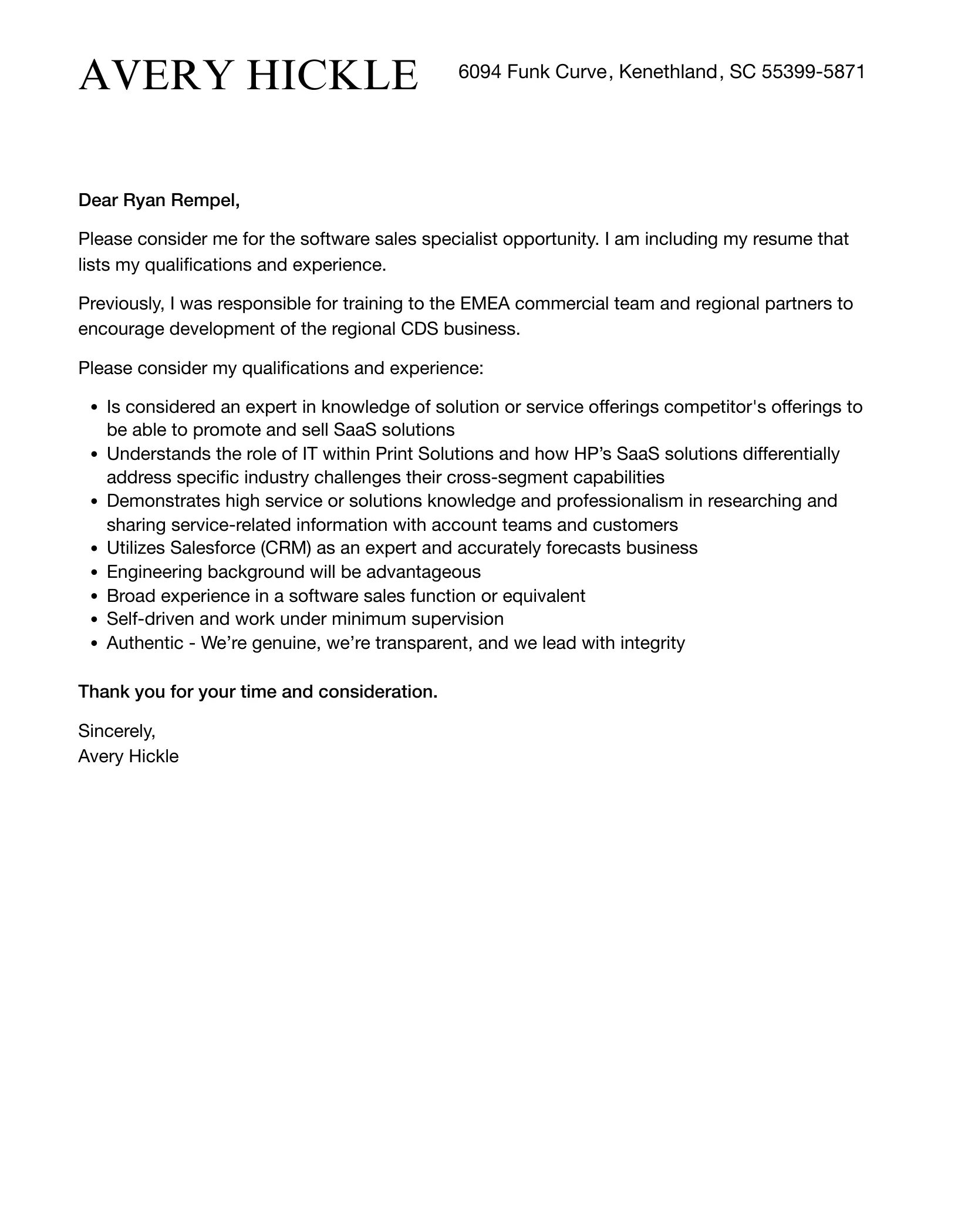
Numbers speak louder than words, especially in sales. Instead of simply saying you increased sales, provide concrete metrics. Did you exceed your sales quota by a certain percentage? Did you generate a specific amount of revenue? Did you reduce customer churn? Always quantify your achievements whenever possible. For example, instead of “Increased sales,” write “Increased sales by 25% in one quarter, resulting in $500,000 in revenue.” This kind of detail makes your accomplishments more credible and impactful. Remember that the more specific you are, the more impressive you appear. Including hard data will help you stand out from other candidates and prove your ability to deliver results.
Tailor to the Software Sales Role
Generic cover letters are easy to spot and often get discarded. Make sure your cover letter is specifically tailored to the software sales role you’re applying for. Read the job description carefully and identify the key skills and qualifications the company is seeking. Then, tailor your letter to highlight the relevant experience and skills you possess. Use the same language and keywords that the employer uses in the job posting. This shows that you have taken the time to understand the role and that you possess the skills and qualifications the company is looking for. Customizing your cover letter will make you look like the perfect fit for the job.
Showcase Your Software Knowledge
Software sales require not only sales skills but also a basic understanding of the software product you are selling. Demonstrate your knowledge of the software industry and your familiarity with the type of software the company offers. If you have experience selling similar software or in a related field, be sure to mention it. If you have certifications or training related to the software or the industry, highlight them. This shows the hiring manager that you understand the product’s value proposition, the target market, and the competitive landscape. Such knowledge gives you a significant advantage over other candidates.
Demonstrate Your Understanding of the Company
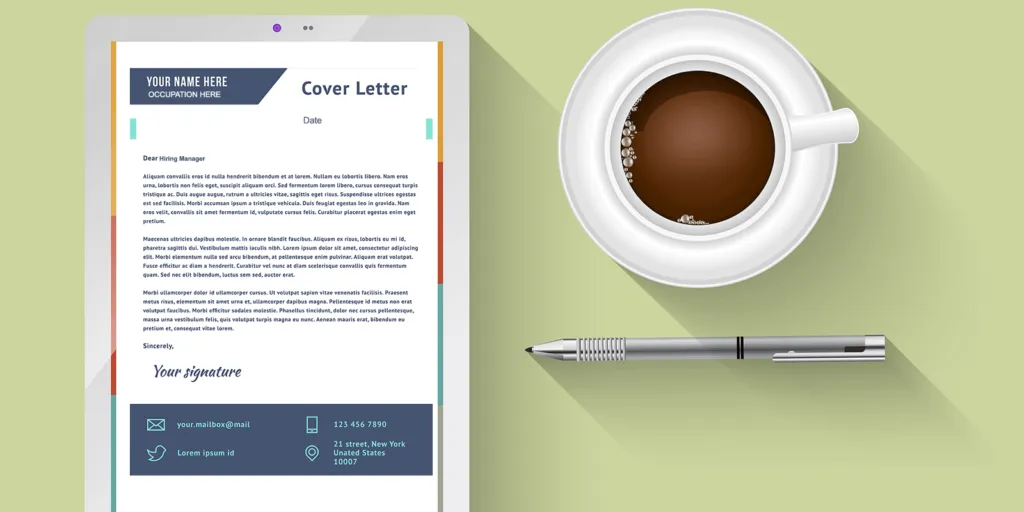
Research the company you are applying to and show that you understand their mission, values, and products. Mention specific things about the company that resonate with you. Explain why you are interested in working there and how your skills and experience align with their goals. This shows that you are not just applying for any job, but that you are genuinely interested in the company. You can visit their website, read their blog, follow them on social media, or even check out news articles about them. This will show the hiring manager you are genuinely interested and have taken the time to get to know the company and its products.
Use Strong Action Verbs
Use action verbs to make your cover letter dynamic and engaging. Action verbs such as ‘achieved,’ ‘managed,’ ‘developed,’ ‘implemented,’ ’negotiated,’ and ’exceeded’ can bring your accomplishments to life and grab the reader’s attention. Instead of writing “responsible for sales,” write “achieved a 15% increase in sales revenue.” Use a variety of action verbs to avoid repetition and to keep your cover letter interesting. Remember that using strong action verbs is an effective way to showcase your abilities and accomplishments. A well-crafted cover letter will immediately stand out in a stack of applications.
Proofread Meticulously
Typos, grammatical errors, and spelling mistakes can immediately disqualify your application. Proofread your cover letter carefully before submitting it. Read it aloud to catch any errors you might have missed. Have a friend or colleague review it as well. A polished cover letter shows that you pay attention to detail and that you care about presenting yourself in a professional light. Make sure your cover letter is free of any errors. This shows you take pride in your work, which is crucial in a sales environment. Remember that a polished cover letter is a reflection of your professionalism.
Key Elements of a Compelling Cover Letter
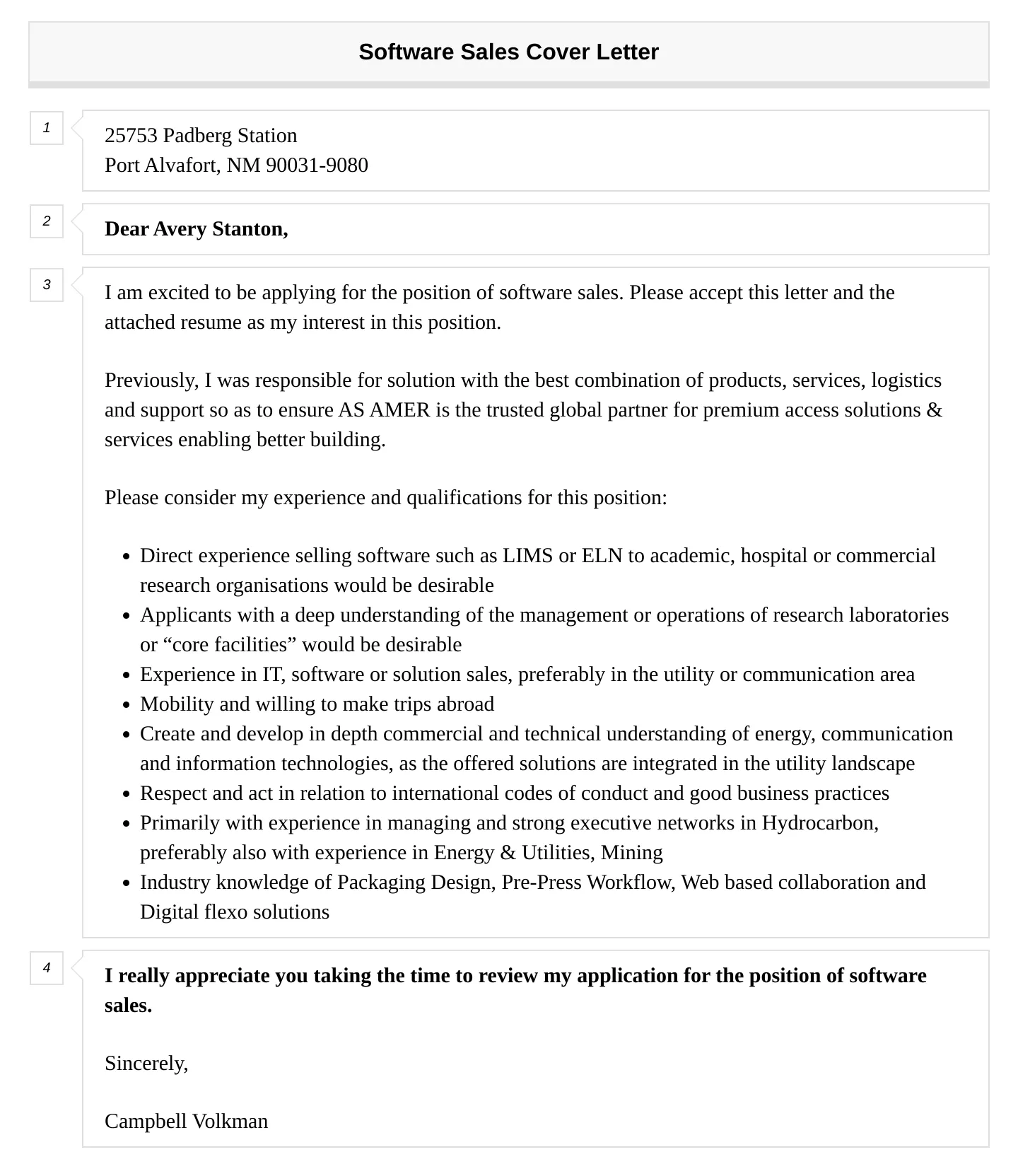
Personalize Your Approach
Avoid using generic greetings like “To Whom It May Concern.” If possible, address the hiring manager by name. This demonstrates that you have done your research and that you are truly interested in the specific position. If you can’t find the name of the hiring manager, try to find the name of the department head or the person who will be your direct supervisor. Personalizing your approach shows you have taken the time to understand the company and the role. This small detail makes a significant difference in the impression you make on the hiring manager.
Address the Hiring Manager Directly
Throughout the cover letter, speak directly to the hiring manager. Use “you” and “your” to connect with the reader and to demonstrate how you can meet the company’s needs. When you write using this method, it allows you to be more conversational, and it builds rapport with the hiring manager. It helps the hiring manager understand how your skills and experience will benefit their company. Highlighting their needs and explaining how you’ll meet them makes your cover letter significantly more compelling than others.
Keep it Concise and Focused
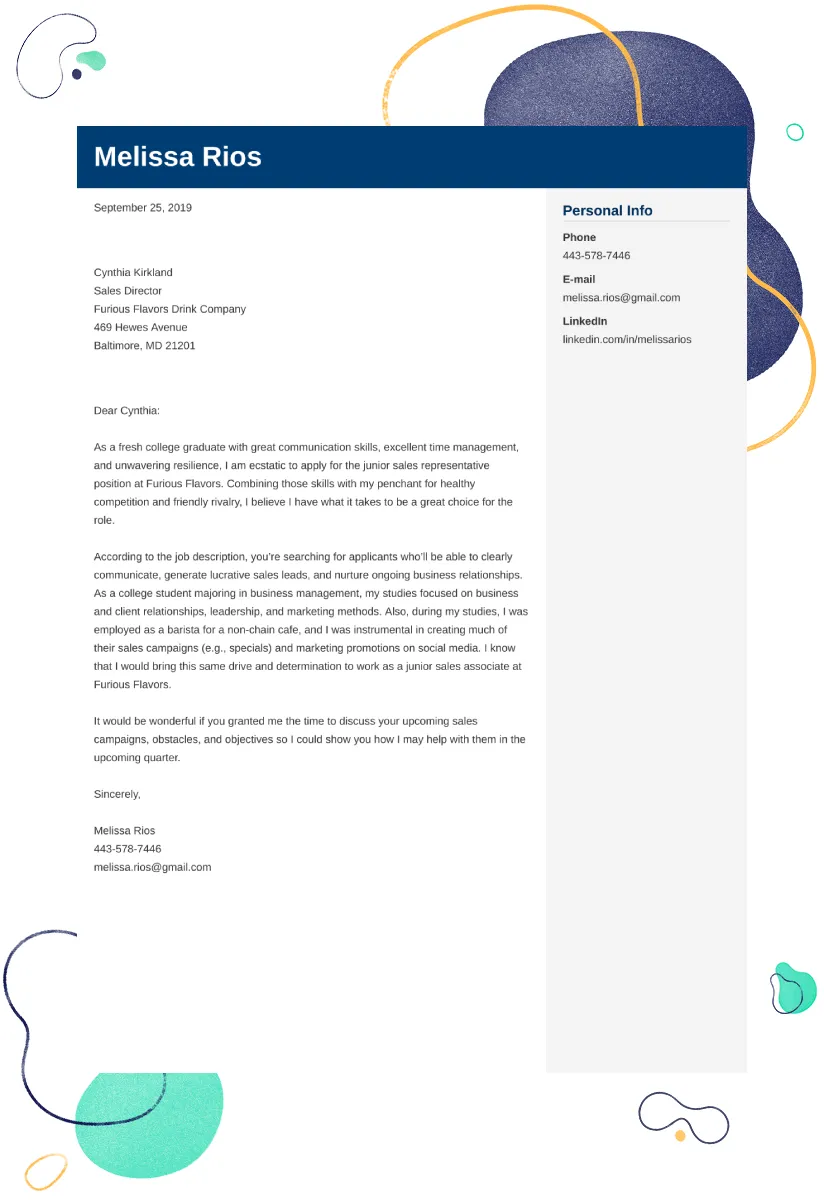
Your cover letter should be concise and focused, generally fitting on a single page. The hiring manager is busy, and they don’t have time to read a long, rambling letter. Get straight to the point, highlighting the most important information about your skills and experience. Avoid unnecessary details. Keep your paragraphs short and easy to read. Your goal is to make it as easy as possible for the hiring manager to see why you are a great fit for the job. Concise, well-written cover letters get read and remembered.
Formatting and Structure Best Practices
Choose a Professional Font and Layout
Select a professional and easy-to-read font such as Times New Roman, Arial, or Calibri. Keep your layout clean and organized. Use a standard font size (11 or 12 points), and use ample white space to make your cover letter easy to scan. Ensure your layout looks neat and professional. The appearance of your cover letter matters. A well-formatted letter is much more appealing to the eye and shows attention to detail. Don’t make it too complex; a clear, concise layout is always best.
Use Clear Headings and Sections
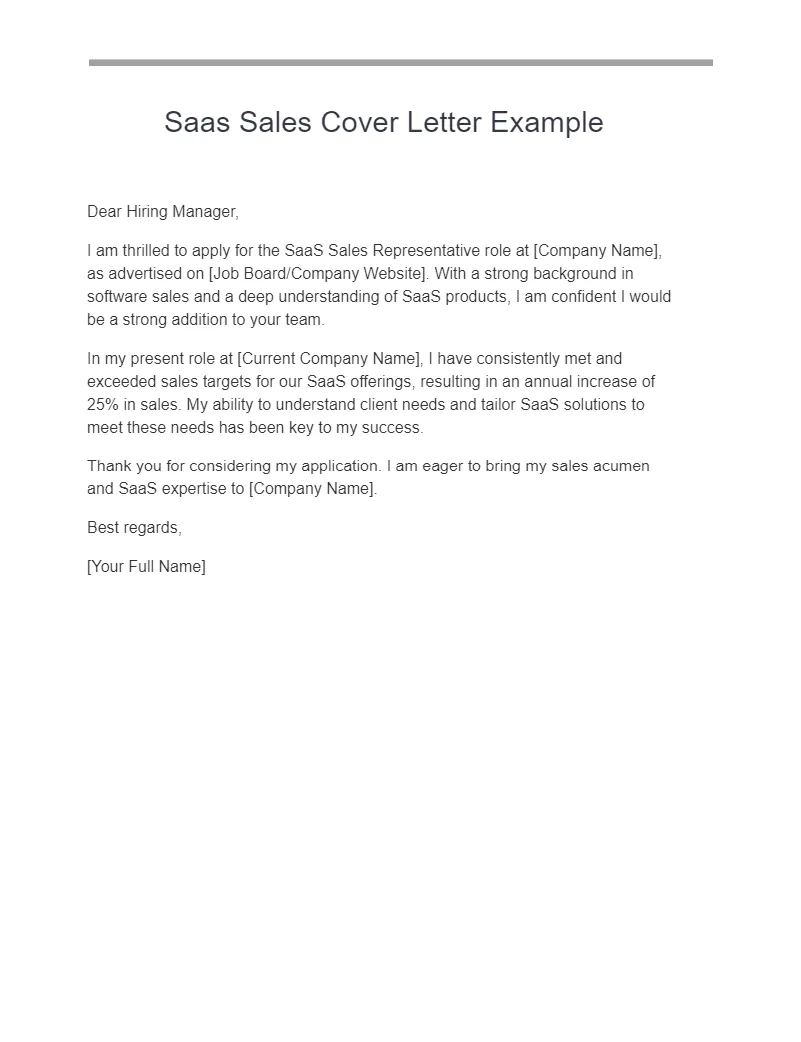
Use clear headings and sections to organize your cover letter and make it easy for the hiring manager to scan. Use headings to break up large blocks of text and to highlight key information. Examples of headings include “Summary of Qualifications,” “Sales Experience,” and “Why I’m a Great Fit.” This makes it easier for the hiring manager to find the information they need quickly. Well-structured sections create a better reading experience and help you highlight your strengths.
Optimize for Applicant Tracking Systems (ATS)
Many companies use Applicant Tracking Systems (ATS) to screen resumes and cover letters. Ensure your cover letter is ATS-friendly by using a standard font, avoiding complex formatting, and including relevant keywords from the job description. ATS systems scan for keywords. Make sure you include them naturally throughout your letter. Avoid using images and tables, as they can confuse the ATS. Use a simple and clear layout. A cover letter that’s easy for an ATS to read increases your chances of getting past the initial screening and having your application seen by a human.
Examples of Effective Sales Cover Letter Content
Opening Paragraph Examples
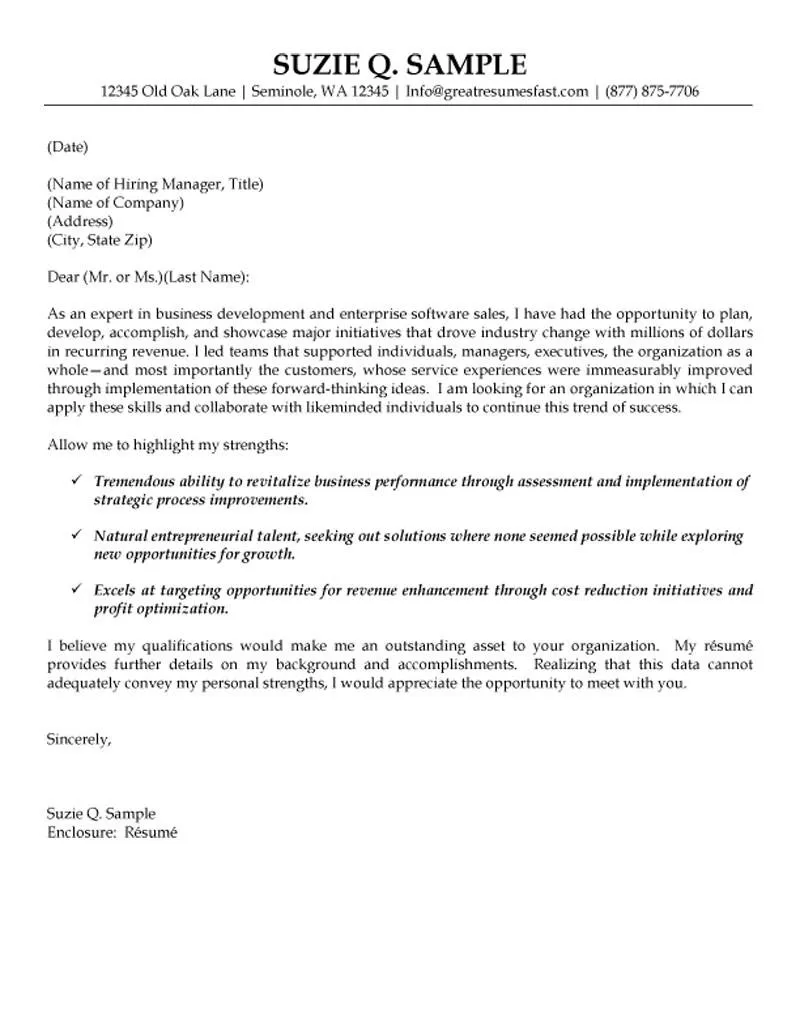
Your opening paragraph should immediately grab the reader’s attention and state your interest in the role. Here are a few examples: “I am writing to express my enthusiastic interest in the Software Sales Representative position at [Company Name], as advertised on [Platform]. With over [Number] years of experience in exceeding sales targets and a passion for [Specific Area], I am confident I can significantly contribute to your team’s success.” Or, “Driven by my passion for technology and proven success in software sales, I was excited to see the opening for a Sales Manager at [Company Name]. My background in [Specific Area] and my proven ability to build strong client relationships make me a strong candidate.”
Highlighting Sales Successes
When highlighting sales successes, provide specific details and use numbers to quantify your achievements. For example, “In my previous role at [Company Name], I consistently exceeded sales quotas by an average of 20% each quarter. I developed and maintained strong relationships with key clients, resulting in a 30% increase in repeat business.” or “I successfully closed [Number] deals in [Timeframe], generating over $[Amount] in revenue. My ability to identify client needs and tailor solutions helped me achieve a 40% conversion rate.” By providing specific details and quantifiable results, you can provide an impressive display of your skills.
Closing Paragraph Examples
Your closing paragraph should reiterate your interest and express your enthusiasm for the opportunity. Here are a few examples: “I am confident that my skills and experience align perfectly with the requirements of this position. I am eager to discuss how I can contribute to [Company Name]’s continued success. Thank you for your time and consideration. I look forward to hearing from you soon.” or “I am excited about the opportunity to join your team and leverage my skills to drive revenue growth. Thank you for reviewing my application. I am available for an interview at your earliest convenience.” Always thank the hiring manager for their time and restate your interest in the position. A strong closing leaves a lasting positive impression.
